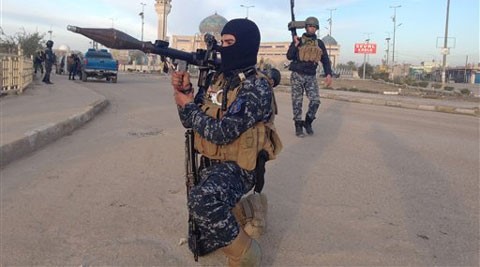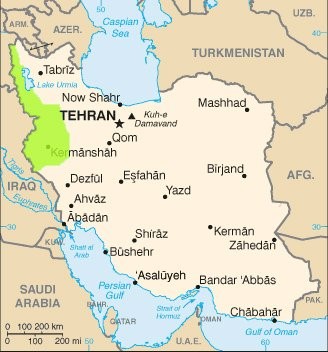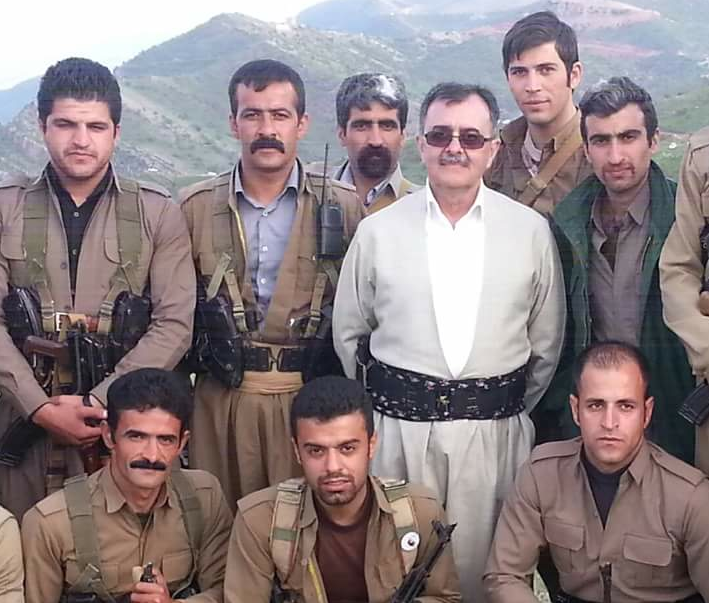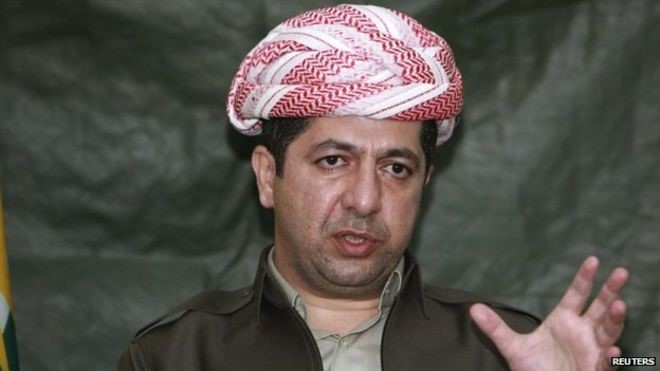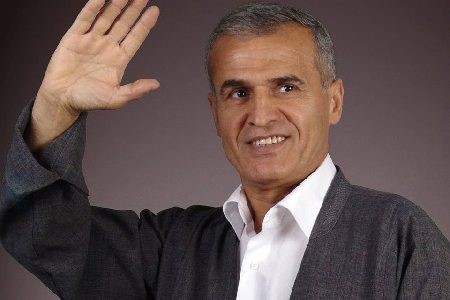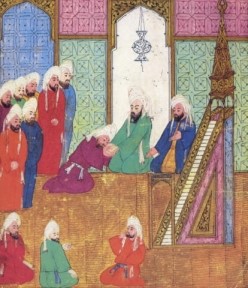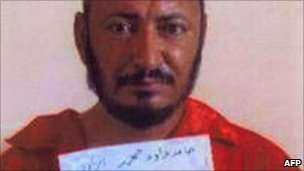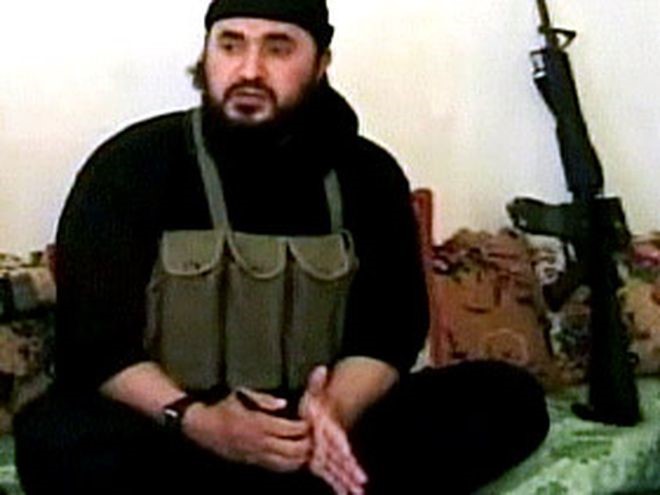Andrew McGregor
July 17, 2009
Despite the arrest on April 23 of a man identified by Iraqi authorities as Abu Omar al-Husayni al-Baghdadi, the elusive leader of the “Islamic State of Iraq” (ISI), audio messages keep emerging from an unseen individual who identifies himself as the authentic Abu Omar al-Husayni (or al-Qurayshi) al-Baghdadi. There are several theories regarding the identification of the mysterious commander of the ISI, an organization closely connected to al-Qaeda in Iraq since its establishment was announced on October 15, 2006.
 Purported Photo of Abu Omar al-Baghdadi
Purported Photo of Abu Omar al-Baghdadi
The latest audio message, over 43 minutes long, emerged earlier this month (Al-Furqan Media Production Establishment-al-Fajr Media Center, July 7). In the audiotape, al-Baghdadi denounces Iraq’s “rejectionist” (i.e. Shiite) government for its celebration of the June 30 American withdrawal from Iraq’s cities in a so-called “Sovereignty Day”: “Even if the occupying Americans have no presence except in a small span of land in the desert of Iraq, away from all forms of lives, every Muslim has to practice jihad against them until their expulsion.”
The ISI leader says little has changed with the withdrawal from urban areas. The Americans still “have the right to interfere in the military, security, and economic affairs; including the right to exterminate, shell, destroy, terrorize, and detain. They have the right to get in and out of the country without any kind of supervision or search. They have the right to loot and plunder the wealth of the country under the guise of exportation, importation, and duty-free [trade].”
Al-Baghdadi has little use for Iraq’s leading Sunni politicians. While the newly elected speaker of parliament, Ayad al-Samarrai (a Sunni Arab and member of al-Tawafuq [Accord Party], the largest Sunni alliance in Iraq’s parliament) praised the U.S. pullback as proof the political process was the best option, the ISI leader insists al-Tawafuq has played “the ugliest role in the history of any agent group that betrays its religion and its country so far,” through its participation in drafting a secular constitution. Tawafuq leader Harith al-Obeidi was assassinated outside a west Baghdad mosque on June 12 in what the Interior Ministry believes was an al-Qaeda operation. The gunman was reported to have either been killed by the mosque’s security guards or to have blown himself up with a grenade (Times, June 12).
Al-Baghdadi goes on to describe Sunni Vice-President Tariq al-Hashimi (former leader of the Iraqi Islamic Party and a potential presidential candidate) as a “criminal” responsible for forming and supporting the anti-al-Qaeda Awakening Councils. Al-Hashimi resigned as secretary-general of the Islamic Party in early June amidst speculation he had been named as an al-Qaeda collaborator during the interrogation of the individual who Iraqi authorities claim is the real Abu Omar al-Baghdadi (Al-Sharq al-Awsat, May 30). Al-Hashimi describes the allegations as a “tempest in a teapot” and responds: “This is not the first time, and perhaps not the last, that the Iraqi Islamic Party is unfairly accused of links to Al-Qaeda. In this regard, I do not free from blame those who are lying to their people and promoting allegations, the falseness of which they are the first ones to know. I feel sorry for their political reputation, because lies will soon be revealed and because Iraqi citizens remember well al-Baghdadi’s statements and his threats to bring woe and affliction upon the members of the Iraqi Islamic Party” (Al-Sharq al-Awsat, June 4).
A number of other Iraqis have been arrested as a result of the “confessions” of the imprisoned man the state says is al-Baghdadi, including Abdul Jabbar Ibrahim, a leading Sunni politician, who now stands accused of terrorism.
Dissecting American Policy in Iraq
Al-Baghdadi argues the American withdrawal from the cities is meaningless as “the U.S. occupier has not come to Iraq to withdraw from it.” The Americans are motivated by economic interests and religious “fallacies,” including “defending the Jewish state [of Israel].”
Al-Baghdadi suggests the American pullback has less to do with strategic objectives than with the war being “the key and genuine reason” for the economic crisis in the United States. In addition, the costs of physical and psychological treatment for U.S. combat veterans and their families are steadily increasing. The departure of most of America’s allies from Iraq and the “devilish alliance [the Coalition]” has increased the economic costs of maintaining the occupation. The “doctrinal, military and ethical steadfastness” of the ISI has “astonished the occupation and made it lose its mind.” The result is the U.S. occupation forces have realized that “the Muslim giant will never die, even if it becomes sick.”
Pointing to the bankruptcy of General Motors and other major American companies, al-Baghdadi says the situation is reminiscent of that which preceded the collapse of the Soviet Union. The ISI leader expects an American collapse “during the administration of the black of Washington” (i.e. President Barack Obama). Shortly after last year’s U.S. presidential election, al-Baghdadi called on the new president to turn to Islam; “I call on you to believe in the one and only God who has no partners. Then declare your Islam so that you may be safe in the worldly life and the afterlife… You have inherited a distorted religion which contains much more falsehood than truth. It was corrupted by [the Byzantine emperor] Constantine and his unjust assistants and followers, who were seeking glory in this mundane world” (al-Furqan, November 7, 2008). Al-Baghdadi went on to suggest an American return to its pre-war policy of isolationism would be rewarded by trade with an independent and Islamic Iraq:
America used to be impartial until World War II, during which it enjoyed security, safety, and development. Once this nation started to lose impartiality and interfere in the affairs of others, it began to lose everything for the sake of a gang of arms and oil dealers who led an entire nation like slaves to destructive wars as a fuel for their endless greed. Today, on behalf of my brothers in Iraq, Afghanistan, Somalia, and Chechnya, I propose to you what is good for you and for us; namely, to return to impartiality, withdraw your troops and go home, and not to interfere in the affairs of our countries directly or indirectly. We promise that we will not stop the trading of oil or other commodities with you, provided that justice is achieved, and provided the prices are not cheap (al-Furqan, November 7, 2008).
Apparently disappointed with the president’s failure to accept his invitation to “return” to Islam, al-Baghdadi has since described the president as “a hireling who apostatized from his religion [Islam]” (al-Furqan, May 30).
Addressing Iraqi Opposition to the Islamic State of Iraq
The ISI leader is critical of other mujahideen groups active in Iraq, mocking them as “phony names for groups visualized in the imagination of those who created them… These names, phony or real, were then blessed by the new leaders in a plan to overlook the Islamic State of Iraq under the pretext that it only represents 10 percent of jihad forces, and that it has no political program… according to their fabrications, [the ISI] is socially outcast as if it came from outer space.” Al-Baghdadi rebukes those who suggest the ISI has no political program; “Is lifting the banner of secularism in the name of democracy and the call for the return of the Ba’ath Party a political program while the Islamic State is not?… The time of patriotism, nationalism and Ba’athism has ended for good, along with its advocates, God willing. We believe that this is the time of the holders of the banner which says there is no god but God [i.e. the monotheist Salafists of the ISI]” (al-Furqan, July 7).
The statement accuses the Badr Corps, the Mahdi Army and the Da’wah Party of Prime Minister Nuri al-Maliki of forming a “rejectionist [i.e. Shiite] tripartite” ruling group in Baghdad that was “raised in the embrace” of Ayatollah Khomeini and has “unprecedented aggression and hate toward anything that is Sunni or Arab” (al-Baghdadi here ignores the fact virtually all Iraq’s Shiites are Arabs). He alleges the Iraqi Shiites (a majority in Iraq) are using all the “tricks and cunning methods the Persians are famous for throughout their history,” including the utilization of democracy as a means of establishing a Shiite state in Iraq. Al-Baghdadi accuses the “dogs of the Awakening Council” of collaborating in this project (al-Furqan, July 7).
The Zionist-Christian Conspiracy to Drive Islam from Jerusalem
In late May, al-Baghdadi released a statement regarding Christian-Jewish ties on the occasion of the Pope’s visit to the Middle East (al-Furqan, May 30). In a 40 minute audio recording entitled “Al-Aqsa [Jerusalem] Between the Deviation of the Christians and the Deception of the Jews,” al-Baghdadi notes the importance some Protestant Christians (particularly those in America) place on the literal interpretation of the first five books of the Old Testament (corresponding to the Jewish Torah) and the prophecies found therein. According to al-Baghdadi, the Jews found this approach “beneficial to their objectives, especially since this movement [i.e. Evangelical Protestantism] began to work strongly toward the idea of the return of the Jews to the holy land in Palestine.”
Although Catholicism has traditionally rejected Zionism as a literal interpretation of symbolic texts, al-Baghdadi suggests the Roman Catholic Church has lately been infiltrated by Zionists, thus explaining the timing of Pope Benedict’s trip to Israel at a time when that nation is ruled by a “fanatical right-wing government” and his outreach to the Jews while ignoring the suffering of the Muslim and Christian Palestinians.
Al-Baghdadi ties the timing of the trip to Benjamin Netanyahu’s determination to reconstruct the Jewish temple in Jerusalem and the apocalyptic thread of Zionist Christianity that believes the temple must be rebuilt before the second coming of Christ will occur. He compares the “end-times” beliefs of each of the three religions of the book:
• The Muslims await the return of Issa ibn Maryam (Jesus, the son of Mary) to “break the cross… and kill his enemies the Jews and his Christian worshippers.”
• The Christians await the return of Jesus to “kill the Muslims and all those who do not believe in his religion at the battle of Armageddon.”
• The Jews await the descendant of David [i.e. the Messiah] so he may “kill the Christians and the Muslims.”
Both Christians and Jews believe the establishment of the state of Israel and the return of the Jews to Palestine are the first step in ushering in the return of their Saviour, according to al-Baghdadi, who accuses the Jews of building a tunnel beneath the Dome of the Rock and al-Aqsa mosque that leads to halls inside the Temple Mount where Jews can pray as “they wait to move to the top floors” when the Islamic holy sites have been destroyed, allowing the reconstruction of the Jewish temple.
According to the ISI leader, Christians and Jews “have disagreed on many things, even on the God that they worship, but they do not disagree on the sanctity of Jerusalem, the return of the Messiah to it, their animosity to Muslims, or the necessity of annihilating them and rebuilding the temple… They are working hard to demolish al-Aqsa.” Al-Baghdadi warns that Muslims are coming from Khorasan [Central Asia], the Maghreb, Somalia and Yemen to foil these plans. The Pope’s call for peaceful coexistence between “the occupiers and the oppressed” demonstrated “his support for the [Zionist] entity’s existence and its right to our desecrated lands.” Al-Baghdadi threatens retaliation against the traditional Christians sects of the Middle East. A series of bombings targeted Christian churches earlier this month (AFP, July 13; Reuters, July 14).
Who Is the Real Baghdadi?
U.S. forces in Iraq have long maintained that al-Baghdadi was a fictitious character played by an actor named Abu Abdullah al-Naima, but later claimed the role of ISI leader had been filled by a real person after the police chief in Haditha claimed in May 2008 that interrogations of al-Qaeda suspects revealed al-Baghdadi was actually a former Haditha native named Hamed Dawood Muhammad Khalil al-Zawi, who had been dismissed from the security services for extremism (Al-Arabiya, May 7, 2008; CBS, May 7, 2008). On May 27, Iraqi security forces reported the arrest of a man they identified as “al-Baghdadi’s brother,” Zaydan Abd Ahmad al-Majmai (al-Sumaria TV, May 27).
U.S. forces have never confirmed the arrest of al-Baghdadi, obviously sharing the same suspicions that cut across Iraqi society. Many members of Iraq’s parliament have expressed their doubts about the identity of the arrested suspect, noting that there have been numerous false reports in the past of al-Baghdadi’s arrest or death (Al-Sharq al-Awsat, April 30). Al-Baghdadi’s arrest was reported three times in one week alone in March 2007.
According to the pan-Arab daily al-Hayat, voice analysts have confirmed the voice on the latest audiotapes is the same as the one that appeared on tapes for two years preceding the arrest of the man Iraqi authorities claim is al-Baghdadi (al-Hayat, May 28). Al-Hayat’s account included an interview with “a prominent Iraqi security source” who suggested authorities had arrested the wrong man: “Al-Baghdadi is a former Iraqi Army officer. He served as a mosque imam in the Al-Hashimiyat region in al-Anbar before he joined the al-Qaeda organization in December 2005… the person who is being held prisoner by the Iraqi Government is Ahmad al-Ahmadi, a former member of the local council in Bahraz.” Various jihadi web forums presented their own versions of the arrest, including suggestions the arrest had been fabricated to attract foreign investment to Iraq, or claims that al-Baghdadi had been detained in Syria and handed over to Iraqi security forces.
The individual claiming to be the true al-Baghdadi has rejected the arrest as a ruse designed to force him into the open; “The key purpose of their lie is to force me to appear, undisguised, in a video. This is a stupid trick that will not force me to do anything. I will appear to the whole world when I want to and when it benefits the mujahideen in the midst of the upcoming victory, God willing… the voice in my audiotapes belongs to me, not to a spokesperson who speaks on my behalf or others and without retouching or alterations (al-Furqan, May 30).
On May 18, Major General Qasim Atta displayed footage of the interrogation of the alleged ISI leader at a media conference. The individual shown stated; “I was born in 1969 and I’m from Diyala [province]. I joined al-Qaeda in 2005 and I formed the Islamic State of Iraq in 2006… I named myself Abu Omar al-Baghdadi because the name Abu Omar represents the Sunnis and al-Baghdadi [represents] the centre of Iraq…” The suspect then went on to describe the internal and external financing of al-Qaeda in Iraq and claimed responsibility for the February 2006 bombing of the Shiite shrine in Samarra that nearly sparked an all-out sectarian war between Iraq’s Sunnis and Shiites (AFP, May 18). According to General Atta, al-Baghdadi’s real name is Ahmad Abd Ahmad, a 40-year-old former military officer. The general was contradicted by Iraq’s National Security Minister, Sharwan al-Wa’ili, who claimed the detained suspect is a former associate of Abu Musab al-Zarqawi whose real name is Ma’ad Ibrahim Muhammad: “He is a former officer of the Republican Guard. Saddam Hussein pardoned him after he was sentenced to death on charges of belonging to Salafi groups. The U.S. and Iraqi forces arrested him several times, but did not discover his identity.”
Conclusion
As the controversy over al-Baghdadi’s alleged arrest continues, the latest audiotapes show a use of language, phrases and ideas based on a wide knowledge of history, political trends and intellectual concepts consistent with statements released before the arrest of the man Iraqi security forces claim is the real Baghdadi. This consistency and the content of the messages raise questions about the true identity of the ISI’s Amir. The audiotapes seem unlikely to be the work of a former low-level security officer or the imam of a local mosque. Baghdad has been unable so far to convince American security forces or even most Iraqis of the legitimacy of their claim to have arrested the real ISI commander. The recent surge in al-Qaeda bombings and assassinations suggests the group remains a dangerous security threat to a restructured Iraqi state, regardless of the real identity of the man giving confessions from an Iraqi prison.
This article first appeared in the July 17, 2009 issue of the Jamestown Foundation’s Terrorism Monitor

